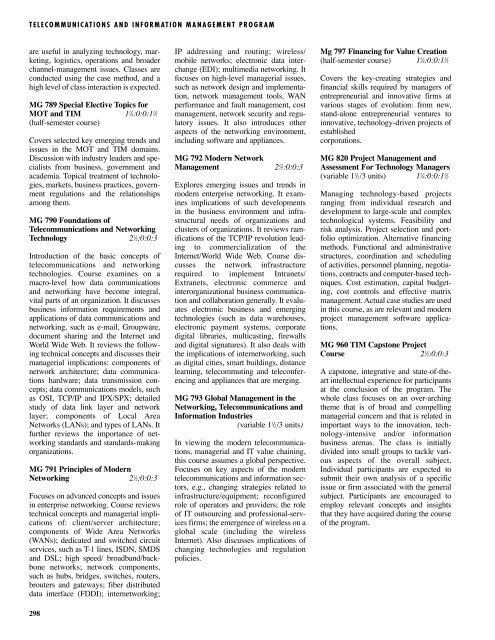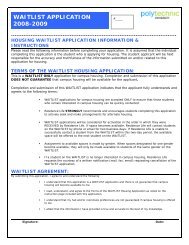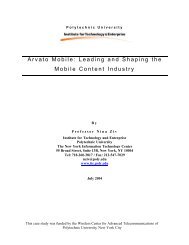POLYTECHNIC UNIVERSITY 2005-2007
POLYTECHNIC UNIVERSITY 2005-2007
POLYTECHNIC UNIVERSITY 2005-2007
You also want an ePaper? Increase the reach of your titles
YUMPU automatically turns print PDFs into web optimized ePapers that Google loves.
TELECOMMUNICATIONS AND INFORMATION MANAGEMENT PROGRAM<br />
are useful in analyzing technology, marketing,<br />
logistics, operations and broader<br />
channel-management issues. Classes are<br />
conducted using the case method, and a<br />
high level of class interaction is expected.<br />
MG 789 Special Elective Topics for<br />
MOT and TIM 1 1 ⁄4:0:0:1 1 ⁄2<br />
(half-semester course)<br />
Covers selected key emerging trends and<br />
issues in the MOT and TIM domains.<br />
Discussion with industry leaders and specialists<br />
from business, government and<br />
academia. Topical treatment of technologies,<br />
markets, business practices, government<br />
regulations and the relationships<br />
among them.<br />
MG 790 Foundations of<br />
Telecommunications and Networking<br />
Technology 2 1 ⁄2:0:0:3<br />
Introduction of the basic concepts of<br />
telecommunications and networking<br />
technologies. Course examines on a<br />
macro-level how data communications<br />
and networking have become integral,<br />
vital parts of an organization. It discusses<br />
business information requirements and<br />
applications of data communications and<br />
networking, such as e-mail, Groupware,<br />
document sharing and the Internet and<br />
World Wide Web. It reviews the following<br />
technical concepts and discusses their<br />
managerial implications: components of<br />
network architecture; data communications<br />
hardware; data transmission concepts;<br />
data communications models, such<br />
as OSI, TCP/IP and IPX/SPX; detailed<br />
study of data link layer and network<br />
layer; components of Local Area<br />
Networks (LANs); and types of LANs. It<br />
further reviews the importance of networking<br />
standards and standards-making<br />
organizations.<br />
MG 791 Principles of Modern<br />
Networking 2 1 ⁄2:0:0:3<br />
Focuses on advanced concepts and issues<br />
in enterprise networking. Course reviews<br />
technical concepts and managerial implications<br />
of: client/server architecture;<br />
components of Wide Area Networks<br />
(WANs); dedicated and switched circuit<br />
services, such as T-1 lines, ISDN, SMDS<br />
and DSL; high speed/ broadband/backbone<br />
networks; network components,<br />
such as hubs, bridges, switches, routers,<br />
brouters and gateways; fiber distributed<br />
data interface (FDDI); internetworking;<br />
298<br />
IP addressing and routing; wireless/<br />
mobile networks; electronic data interchange<br />
(EDI); multimedia networking. It<br />
focuses on high-level managerial issues,<br />
such as network design and implementation,<br />
network management tools, WAN<br />
performance and fault management, cost<br />
management, network security and regulatory<br />
issues. It also introduces other<br />
aspects of the networking environment,<br />
including software and appliances.<br />
MG 792 Modern Network<br />
Management 2 1 ⁄2:0:0:3<br />
Explores emerging issues and trends in<br />
modern enterprise networking. It examines<br />
implications of such developments<br />
in the business environment and infrastructural<br />
needs of organizations and<br />
clusters of organizations. It reviews ramifications<br />
of the TCP/IP revolution leading<br />
to commercialization of the<br />
Internet/World Wide Web. Course discusses<br />
the network infrastructure<br />
required to implement Intranets/<br />
Extranets, electronic commerce and<br />
interorganizational business communication<br />
and collaboration generally. It evaluates<br />
electronic business and emerging<br />
technologies (such as data warehouses,<br />
electronic payment systems, corporate<br />
digital libraries, multicasting, firewalls<br />
and digital signatures). It also deals with<br />
the implications of internetworking, such<br />
as digital cities, smart buildings, distance<br />
learning, telecommuting and teleconferencing<br />
and appliances that are merging.<br />
MG 793 Global Management in the<br />
Networking, Telecommunications and<br />
Information Industries<br />
(variable 1 1 /2/3 units)<br />
In viewing the modern telecommunications,<br />
managerial and IT value chaining,<br />
this course assumes a global perspective.<br />
Focuses on key aspects of the modern<br />
telecommunications and information sectors,<br />
e.g., changing strategies related to<br />
infrastructure/equipment; reconfigured<br />
role of operators and providers; the role<br />
of IT outsourcing and professional-services<br />
firms; the emergence of wireless on a<br />
global scale (including the wireless<br />
Internet). Also discusses implications of<br />
changing technologies and regulation<br />
policies.<br />
Mg 797 Financing for Value Creation<br />
(half-semester course) 1 1 ⁄4:0:0:1 1 ⁄2<br />
Covers the key-creating strategies and<br />
financial skills required by managers of<br />
entrepreneurial and innovative firms at<br />
various stages of evolution: from new,<br />
stand-alone entrepreneurial ventures to<br />
innovative, technology-driven projects of<br />
established<br />
corporations.<br />
MG 820 Project Management and<br />
Assessment For Technology Managers<br />
(variable 1 1 /2/3 units) 1 1 ⁄4:0:0:1 1 ⁄2<br />
Managing technology-based projects<br />
ranging from individual research and<br />
development to large-scale and complex<br />
technological systems. Feasibility and<br />
risk analysis. Project selection and portfolio<br />
optimization. Alternative financing<br />
methods. Functional and administrative<br />
structures, coordination and scheduling<br />
of activities, personnel planning, negotiations,<br />
contracts and computer-based techniques.<br />
Cost estimation, capital budgeting,<br />
cost controls and effective matrix<br />
management. Actual case studies are used<br />
in this course, as are relevant and modern<br />
project management software applications.<br />
MG 960 TIM Capstone Project<br />
Course 2 1 ⁄2:0:0:3<br />
A capstone, integrative and state-of-theart<br />
intellectual experience for participants<br />
at the conclusion of the program. The<br />
whole class focuses on an over-arching<br />
theme that is of broad and compelling<br />
managerial concern and that is related in<br />
important ways to the innovation, technology-intensive<br />
and/or information<br />
business arenas. The class is initially<br />
divided into small groups to tackle various<br />
aspects of the overall subject.<br />
Individual participants are expected to<br />
submit their own analysis of a specific<br />
issue or firm associated with the general<br />
subject. Participants are encouraged to<br />
employ relevant concepts and insights<br />
that they have acquired during the course<br />
of the program.




